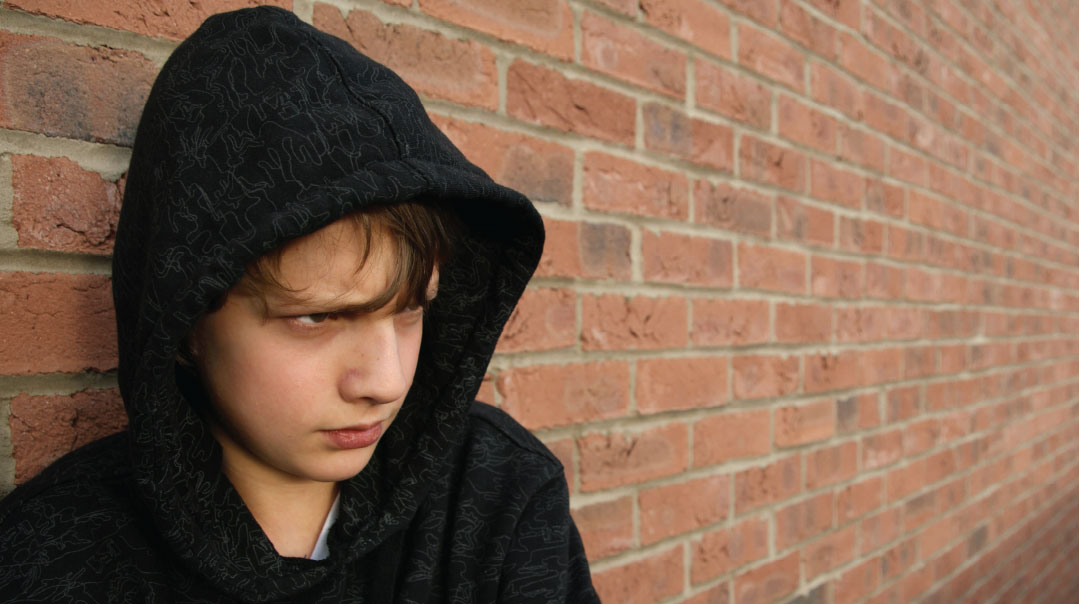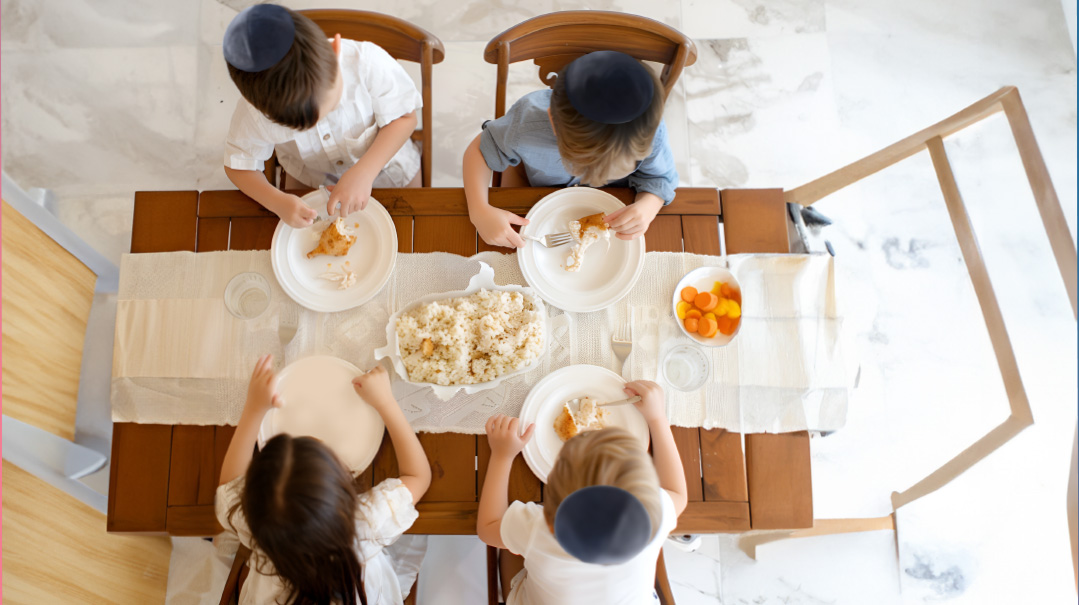The Magic Maker
| November 6, 2019He was saving the world. But she needed him home

There’s no such thing as a false alarm.
She knows that; learned it her first day on the job. A dozen years later, she still knows it (and if she forgets, Eli reminds her). But still, it doesn’t stop her heart clenching a little in frustration when he picks up the phone, again, makes that little apologetic sign with his hand and gives her a half smile that says, “This is super important, I’ll be back later.”
It’s not that she doesn’t appreciate what he does. She gets reminders all the time — thank-you gifts and Erev Shabbos flower deliveries and of course, there’s always a fan club waiting to pounce on her in the grocery aisles. “Your husband saved our son,” they say, sometimes with a tear or two springing from their eyes. And she’s so happy. But also, in the deepest depths of her heart, the tiniest bit frustrated. Dare she admit it?
She sighs and then quickly switches on a smile for the kids. It’s not their fault. It’s Chol Hamoed, and they’ve been up early in anticipation of the day’s plans. Someone has to be there for them.
“Let’s get ready for the trip!” she says, mustering cheer.
“Is Daddy coming?” Reuvy asks. His eyes are brown and just like Eli’s. He’s an intuitive one, her eldest.
“I… we’ll see. Daddy had to take a very important phone call. He might not be back for a while.”
“Is Daddy helping boys again?” little Sara questions. “Like all the other times?”
Like all the other times.
Like the Motzaei Shabbos pizza party that wasn’t. Like the road trip cut short and the lonely weeknight suppers and menorah lighting way after all the other windows on the block have dimmed and darkened.
“Yes,” she tells Sara, rumpling her daughter’s hair to avoid meeting her eyes. “Like all the other times.”
She hates driving the van. Eli knows that. She tried calling him before, twice, and then sent a text. The reply: So, so sorry, Lay. Real emergency. Can u take the kids and I’ll meet u guys there?
“Seat belts,” she says through tight lips.
The kids squeal and bicker and munch on snacks that leave crumbs carpeting the van. Great.
She switches on music to try and drown out the thoughts. It doesn’t help.
So when is he going to turn up? Now? Soon? At closing time? He could be anywhere, doing anything. She had no idea when her husband had become the first point of call for parents of teens in crisis, but he was already in the field before they got married.
He’d been older than the other boys she’d been redt — nearly 30, while she was 24. He was also working part-time, learning in the evenings, mentoring struggling teens in his spare time. From the first moment they met, she understood why the boys were drawn to him: Eli had a sparkling energy, a dynamism that blended with a sincere sensitivity.
“When are we getting there?” Sara calls. Layla glances at Waze.
“Soon.”
She’d been taken by it, the way he talked about people, the love, the fearlessness. He could do anything, talk to anyone. People raved about Eli’s magic. The teens loved him, the parents loved him, the principals grudgingly gave in to him. They respected him, she knew. He thrived on the work, he loved it.
And she… she loved it too. Until.
Layla slows for a red light. She frowns. When had everything changed?
“Maaaa,” someone whines from the back seat. She catches her sour expression in the mirror and forces a smile.
“Nearly there, kids,” she says, trying to inject some of Eli’s cheer into her voice. It isn’t fair, he should be here, the kids would be eating out of his hand and probably playing some road game, enjoying the drive just as much as the theme park.
But he isn’t, and she can’t even sulk, she has to be there as a lame substitute, forcing a smile.
She turns the music up even louder.
The park is every bit as bad as she’d known it would be: hot and sticky, endless lines. And every kid wants to go in a different direction.
“But Ma!” Reuvy complains. “This is the fourth baby ride, and you promised I could go on the Crazy Extreme, and why do Devori and Sara always choose?”
Because the lines for the Crazy Extreme are about two hours long, and you’re the only one who can go on it, so I have to wait with four little ones who are hot and tired and hungry for anything but the food I’ve packed, and if Eli were here…
She checks her phone. No message.
“When Daddy comes,” she tells Reuvy. That would be easier. They could split the party and she’d sit with the little ones by the merry-go-round while Reuvy had all the scare-factor fun he wanted.
Reuvy’s face lights up and falls again. “But he’s not coming. He never does.”
After another half an hour, with no updates, she plants herself in the line for the Crazy Extreme. It’s even longer than before. The baby’s crying, and Sara and Devori start to squabble, and Reuvy, who all this is for, is still sulking about how many baby rides he had to wait by.
Only an hour or two to go.
There are children and noise and yarmulkes everywhere. Couples with strollers and little ones swarming around them, husband and wife, mother and father. Layla winces.
Don’t complain, she tells herself, fiercely. You’re not alone, you have a husband, an amazing husband, he’s just not here right now….
A tall woman, white-blonde sheitel and sunglasses that mask her eyes, lays a hand on Layla’s arm. She jumps.
“I’m sorry. I think I recognize you. You’re Eli Stern’s wife, aren’t you?”
She nods, resisting the urge to roll her eyes. Here we go again.
“Your husband,” the woman leans in, her voice lowered to a confidential stage whisper. “We owe him everything. Everything! You see my son?” She gestures toward a group of teens. Layla gives a vague nod. “He… he literally saved him. Your husband is a miracle worker, you know?
“He’s not here, is he? I always wanted to thank him again, but you know how it goes, it’s hard to get around to these things, the days just fly….” She sighs theatrically. “Well, please tell him best regards from Judy, and thanks again. He’ll know who I am. And you should be proud, Mrs. Stern, really, your husband does great things.”
And she disappears, in a wave of confidence and floral scent, and Layla watches her go, back to join her husband and happy family, their miracle son, and she thinks: Of course he does great things. For everyone but his wife.
Motzaei Shabbos is literally the worst time; it’s like 25 hours of crisis explode all at once when Shabbos is over. Eli’s phone is ringing off the hook before he’s even home from Maariv. She counts six missed calls.
“Gut voch!” he strides in, reaching for the phone and tossing off his coat. “Havdalah, kids!”
She watches his eyes widen and narrow; fingers fly across the keyboard.
“Hello,” she says archly.
Eli glances up, then back down again. “It’s gonna be a long night, Lay.”
She plasters on the widest, falsest smile. “Isn’t it always?”
He doesn’t seem to hear the sarcasm.
The flame is still sizzling in the wine, little spots of wax dripping on the table, when Eli’s coat is back on. “Do you need the car tonight, Layla?”
“Aren’t I watching the kids?”
He peers at her over the phone screen. “Yeah, I guess you are. Sorry,” he offers. “Um, if it’s alright with you? It’s just this group of boys, they were suspended from yeshivah last week, and they’ve run into some kind of trouble downtown. I’m going to go over there.”
She sighs and tries to think of mothers with tightness in their throats and fear squeezing at their chests.
“Yeah, yeah, do your thing. They call you magic, you know.”
The words are okay, but the bitterness seeps through, and it stays when the door slams and the engine revs and she’s left with bedtime and dishes and the remains of the cholent to scrub. And when that’s all done, when the house is sparkling and the kids asleep and the clock ticks past 1 a.m. and still Eli isn’t home — that’s when she’s had enough.
“I can’t do this anymore,” she says out loud.
“I can’t do this anymore,” she says again, half an hour later when the door opens quietly, and Eli pokes his head in and says, “Layla! I thought you’d be sleeping!”
And then, having heard what she said, he takes a step inside and asks cautiously, “What can’t you do anymore?”
She sees herself reflected in the glass breakfront, floral head scarf and tired eyes. The room is achingly clean, candlesticks gleaming, and everything is perfect and terrible.
“This,” she whispers. “All of it. By myself. I can’t do everything here, nights, Shabbos, Chol Hamoed.”
He sits down, a strained look coming over his face. “We’ve talked about this before. It’s part of what I do, you know that.”
“Of course I know that, you’ve told me a million times,” she snaps. Eli’s eyes widen. “Sorry,” she mutters.
Eli leans forward, puts on his calmest voice. “Layla, let’s talk about this. What happened? Something specific? Has something changed?”
It’s a script that replays more and more often these days. She sighs.
“Nothing changed. I know this is what I signed up for, you told me before we got married. Unfortunately, the need’s only grown bigger. But it’s just too hard. You’re never around. The kids need you. I… we all do. Take a day job in chinuch, work normal hours, come home and let us live, without these endless phone calls and emergencies. It’s enough already.”
Eli takes his time before replying. “I hear,” he finally says. “It’s taking more and more of my time, the kids are getting older, it’s harder to make it work.”
It’s his validating thing again, what he does with the boys, but she’s not buying it tonight.
“Yes, and that’s why we need to do something.”
Eli stands again, he’s pacing, a sure sign of agitation. “Layla, I know you’re stressed out now, but let’s think this through, okay? There are people really suffering out there.”
“Excuse me?” she flares up. “This isn’t about stressed out, okay? This is a lifestyle. I’ve been pushing myself like crazy for years already. I’ve thought it through. I need a change. We need a change, the whole family, okay?”
He’s quiet. She knows he’s going to give her that disappointed look, like he thought she was above this. “Layla, you know how important this work is, how many teens have been saved, you were always so happy to be part of it, no?”
“Not anymore. Not when it’s taking you away from our family.”
Eli pulls out his phone, a reflex action, and it pings in his hand. He drops it on the table. Layla stares.
“See, Lay, I can do it. I can let go of all this, and I’ll leave it if I have to. If you need me to. I’m not a fool, I can’t go on helping other families at the expense of ours.” He pauses, and the offer blinks neon lights before her eyes. “But Layla, there’s a need for this sort of work, and if you — if we can continue, make it work somehow — it’s a big zechus. Not many people have the opportunity to make a real difference.”
She knows what she should say. It’s the penultimate line of their script: She should retract, apologize, say it’s been a hard day. Don’t worry about it, forget what I said, everything looks better in the morning.
But tonight, for the first time, she can’t.
I’m a terrible wife.
Eli puts the car into park, but he doesn’t move. She reaches for the door handle. He’s too quiet; it’s not Eli.
Her husband realizes it, too. Gives a resolute shake of the shoulders, catches her eye with a sidelong glance. “I guess that’s it, then.”
He is out of the car, key in hand, before she can even think of a response.
The Rav said. We asked, he answered. I’m not doing anything wrong.
“Lay?”
She opens the door slowly. Why is he so calm, collected? Isn’t he upset? She wishes he would say something.
But he doesn’t. He doesn’t say anything while she sets the table, serves the chicken and rice. Then he looks up and says, “It’ll take a couple of weeks, you know.”
Two weeks. Time to hand over the reins, to step down from his volunteer work without dropping anyone cold turkey.
“Sure,” she says magnanimously. She can afford to be magnanimous now.
Two weeks and life will be her own again. Two weeks and they will be a family, just the two of them and the kids, without carrying the world’s problems wherever they go. Two more weeks of midnight phone calls and Motzaei Shabbos emergencies, two weeks of failed family trips and fake-smiling at blonde women in perfect sheitels whose sons are saved while she struggles, single-handed.
When Eli comes home from work the next day and about-faces a minute later, talking furiously into his Bluetooth, she just smiles and decides to treat the kids to homemade pizza. They’ve been sacrificing too, all these years, giving away their time with their father. They deserve something special. And next impromptu pizza party, Eli will be joining.
He’s still on the phone a lot though, maybe trying to cash in on the short time left.
She feels a twinge of remorse. He’s going to miss it, the adrenaline rush, the satisfaction. But then again, hadn’t he said himself that family comes first?
She is surprised but happy when he comes into the kitchen to talk, phone nowhere in sight.
“What’s up, Lay? Smells good.”
She can’t remember the last time he had a few free minutes in the middle of the day. She wants to grin, to laugh, to dance, but instead she shrugs and says, “All good, you?”
“Yeah, fine,” he says. The light tone has left his voice. She looks up from the onions she is dicing and his shoulders are drooping, like they are too heavy for his body.
“You want something to eat?” she offers lamely.
“Nah,” Eli sticks his hand in his pocket; the phone is vibrating again. “Oh, this is important, I’m going to take it, is that okay?”
“Sure, go ahead,” she says cheerfully. With just days to go, the cheerfulness comes easily.
Her husband bounds outside, to the little porch where he likes to pace while he conducts his confidential phone calls. She watches him, the electric current of energy is back. He is standing tall again, and the rise and fall of his voice is passionate, energized.
She feels like she’s walking a tightrope, taut, thin, and deadly.
Has she made a terrible mistake?
The front door thuds, hard. Then again. Someone is kicking the wall.
“Who’s there? Reuvy?” Layla peels off a disposable glove, rushes into the hallway. “What’s going on?”
His face is dark. Flushed and furious. “It wasn’t me!” he yells. “It wasn’t me, and the rebbi thought it was, and the whole class didn’t believe me!”
Layla presses a hand to her temple. Not this. Not again. She’s heard too much about Reuvy and his rebbi.
“What happened?” she asks.
“I hate him! I hate him!” Reuvy throws down his knapsack. It skitters on the floor, opens. Books and papers are everywhere. In the kitchen, Devori starts to cry. The soup is boiling over, Sara’s waiting for her help with her homework, and Reuvy‘s kicking the wall again, the mirror above twitching dangerously.
“Reuvy, let’s talk about this….”
“I don’t want to talk about it!”
The words somersault through the air. Layla reels. What? What should I say now? What am I supposed to do? How am I supposed to handle this?
She opens her mouth, searching for words. Before she can find them, a shadow throws itself between her and Reuvy. Eli steps out of the dining room.
She hadn’t even known he was there.
“Layla,” he says, his voice strong, “I’m here. I’ll take care of this. Reuvy, clean up your knapsack, and then we’ll go for a drive, figure things out.”
It takes a minute to convince herself that this is real, it’s not a dream. By that time, they’re already gone.
Homework, she reminds herself. Devori. Supper.
Eli comes back hours later, gives Reuvy supper, sends him to bed. Layla doesn’t ask questions. He’ll fill her in later.
The house is quiet, and the soup is hot. Eli swallows a mouthful and smiles. “Great soup, Lay. And wow. We gotta talk about Reuvy and this rebbi situation. It sounds like it’s been going on a while.”
She nods and she thinks about how he has no idea how long it’s been going on for. And how she has to tell him, but she’s tired, so tired, and she only now realizes how tired she’s been of it all. And how he’s full of energy, the same energy she remembers from his days of mentoring, only now it’s being given to their own children.
And suddenly she’s crying over her vegetable soup, salty tears that slide down her cheeks and drop somewhere near her spoon.
“Layla, what? What’s wrong?”
She shakes her head, stands up to clear the bowls. “A few weeks ago — you would never have even known about this.”
A grimace crosses Eli’s face. “I know, Layla. I was thinking the same thing.”
The dining room is quiet when she comes back with the main course. Eli’s looking down, intent on his phone, brow scrunched. Her stomach lurches.
She tries to relax, throw her shoulders back, let it be, but she let it be for too long. She can’t do it again.
She sets the tray down, clears her throat. Eli smiles up at her, his eyes liquid light. “Layla. Look at this, I want to show you.”
It was an e-mail, rows of urgent, marching letters. Layla squints.
“Here.”
A line catches her eye: growing up with little or no connection to their father…
“Wait, what is this?”
Eli swipes and the screen goes dark. “It’s a long letter from a mechanech I’ve spoken to a lot. We were talking about what can be done to help the kind of boys I’ve been working with. In his opinion, so much can be prevented if the fathers are more positively and actively involved with the children as they grow up.” He coughs.
“I— we agreed about that. I spoke to so many parents, begged people, wrote letters explaining how much a child needs his parents… how dangerous it is when the parent is uninvolved in the child’s life….”
She’s suddenly aware that her breath is caught in her throat. Eli looks away, up at the ceiling. Then he meets her eyes.
“I nearly turned into that parent,” he says.
Eli’s around for bedtime again. It’s still fresh enough to be exciting.
“Reuvy? I’m ready when you are,” he calls up the stairs. Layla is in the kitchen, packing lunches. She wonders what they’ll be doing. It’s nice not to know everything, though.
Eli’s cell phone buzzes from its hibernation on the kitchen counter. The ringtone brings a flash of memory, and a tug of guilt. People are still calling him, all the time. People are desperate.
“Maybe you should take it,” she offers. “I can handle bedtime for today.”
He looks at the phone, then back at her. “But I promised Reuvy I’d be around tonight.”
She opens her mouth to say that it’ll be okay, she’ll explain to Reuvy. Then she closes it again.
“He’s not available just now,” she says into the phone. “But you could try in an hour.”
She goes upstairs to check on the girls. Reuvy’s door is open, and she hears their voices, her husband’s and her son’s. But even as she creeps over to glance inside, Reuvy’s eyelids drop, heavy with sleep.
Layla watches for a moment.
Eli looks up, sees her. His eyes laugh. “Bedtime in seven minutes. Who would’ve believed?”
Layla smiles. “They called you the magic maker for a reason,” she says.
(Originally featured in Family First, Issue 666)
Oops! We could not locate your form.













